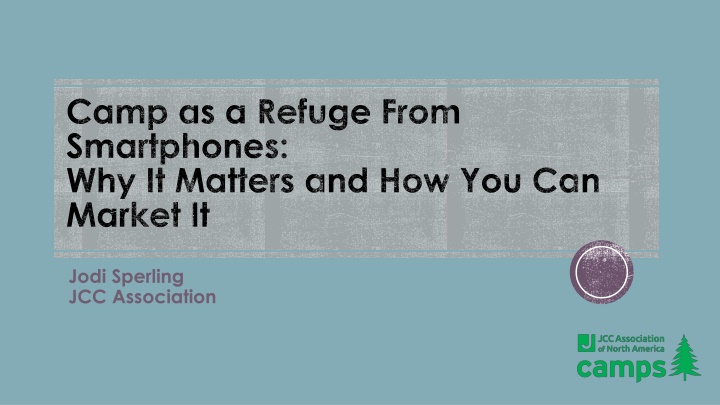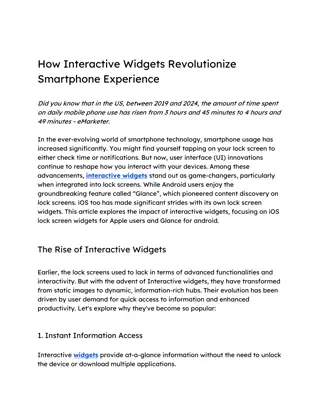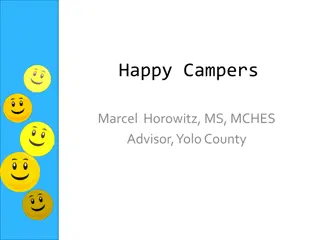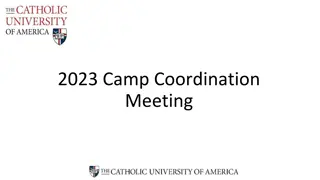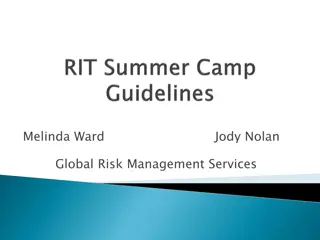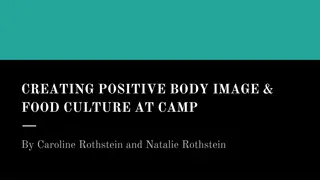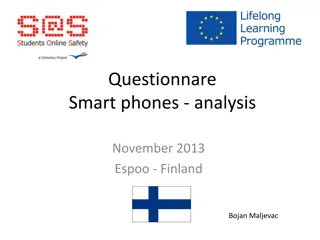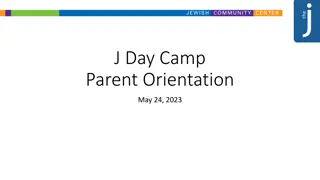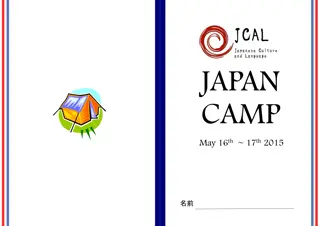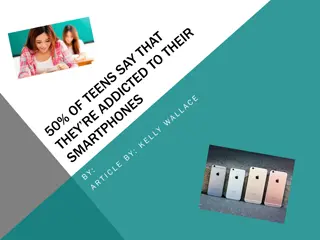The Impact of Smartphone Culture on Teens at Camp: Research Insights and Strategies
Discover the alarming statistics of smartphone addiction among teens and how camps can serve as a refuge from this digital dependency. Gain insights on educating parents, marketing unplugged policies, and promoting face-to-face interactions to enhance camp experiences. Explore research methodology, objectives, and participating camps invested in tackling smartphone overuse.
Download Presentation

Please find below an Image/Link to download the presentation.
The content on the website is provided AS IS for your information and personal use only. It may not be sold, licensed, or shared on other websites without obtaining consent from the author.If you encounter any issues during the download, it is possible that the publisher has removed the file from their server.
You are allowed to download the files provided on this website for personal or commercial use, subject to the condition that they are used lawfully. All files are the property of their respective owners.
The content on the website is provided AS IS for your information and personal use only. It may not be sold, licensed, or shared on other websites without obtaining consent from the author.
E N D
Presentation Transcript
Camp as a Refuge From Smartphones: Why It Matters and How You Can Market It Jodi Sperling JCC Association
Session overview Background Research methodology Preliminary key findings Applying the research to: oCamp marketing oParent education oIncreasing camper and staff awareness
Background 65% of teens wish they had a greater ability to self-limit their screen time. They estimate that 60% of their friends are addicted to their phones. 50% label themselves as being addicted to their phones. 45% of teens say they are constantly on their smartphones. (Was 24% in 2014-15 study) 33% of teens spend more time socializing with close friends online, rather than face to face. 69% of teens wish they could spend more time with their friends face-to-face and less time socializing online. (Statistics from the 2018 Teen Smartphone Addiction National Survey, Common Sense Media, and the 2018 Teens, Social Media, and Technology Pew Center Study)
Background Gen-Z Relieved To Escape Their Smartphones For Several Weeks, Study Suggests Screen Education addresses issues at the intersection of information technology and human wellness through research and education. Stark Statistical Consulting provides statistical support for researchers, innovators, and entrepreneurs.
Research methodology Set objectives 1. Facilitate focus groups during camp 2. Design online survey 3. Conduct online survey after camp 4.
Objectives 1. To gain insights that will be useful in educating parents about the rationale behind the unplugged policies that many camps enforce. 2. To gain insights that will be useful in securing the support of parents for the unplugged policies that many camps enforce. 3. To gain insights that will be useful in marketing overnight camps as the only place offering refuge from smartphone culture. 4. To gain insights that will be useful in demonstrating to parents that spending time away from phones is beneficial to kids development and growth, and is one of the few successful interventions that can disrupt the spike in mental health concerns for kids and teens regarding smartphone overuse. 5. To gain insights to encourage camps that currently enforce unplugged policies to remain unplugged. 6. To gain insights to encourage camps that currently enforce unplugged policies to add smartphone addiction awareness education for all ages that capitalizes on the unplugged environment as an opportunity for self-reflection and encourages post-camp self- management.
Participating Camps Akiba Summer Camps Camps Airy and Louise B nai Brith of Ottawa Beber Camp Berkshire Hills Eisenberg Camp Bold Earth Adventure Camps Camp Anokiing Camp Barney Medintz Camp Blue Ridge Capital Camps Camp Chi Camp Daisy and Harry Stein Eden Village Camp Emma Kaufmann Camp French Woods Camp Camp Galil Gilding Hilltop Camp Camp Havaya Herzl Camp Camp Interlaken Camp JCA Shalom Camp Livingston Camp Moshava Ennismore Camp Moshava I.O. Camp Mountain Chai NJY Camps Camp Nock-A-Mixon Camp Ojibwa Olin-Sang Ruby Union Institute Camp Pathfinder Perlman Camp Ramah California Ramah New England Ramah in the Rockies Camp Sabra Camp Seneca Lake Tamarack Camps Camp Tevya URJ Camp Harlem URJ Camp Coleman URJ Eisner Camp URJ Six Points Creative Arts URJ Six Points Sports Camp Wise Camp Yavneh Camp Young Judaea Texas Young People s Summer Stock
Key findings 100% of the teens (11-16) have their own smartphone. 30% of teens say that several times a day they think about wanting to stop using their smartphone, but don t. 69% reported that they would be happier if they could spend less time on their smartphone.
Key findings 93% of teens said they were relieved to have a break from social media while at camp. 72% said their camp experience would have been worse if they had been permitted to bring their smartphones to camp. On a scale of 0-100, teens rated their level of happiness at not having smartphones at camp at 82 and rated their level of frustration at 20.
Key findings In what ways did your camp s ban on smartphones positively impact your camp experience? I got better at making friends. It let me focus on only the people and the environment. I really enjoyed how everyone got to see and experience the things right in front of us and I got to make many new friends. Everyone was able to live in the moment. It gave me time to focus on making relationships. We used our brains more. We were creative. We played real games instead of just online games. We had so many more meaningful social interactions. More face-to-face conversations. We made much closer and more meaningful bonds. We felt free from the world of judgment, cruelty, and fake standards that is social media.
Key findings 91% of teens felt they got to know people better at camp as a result of not having their phones. 57% of teens reported experiencing and witnessing less bullying while at camp because there was not access to social media. 79% of teens reported feeling less anxious and stressed at camp because they don t have to keep up with their social media presence.
Key findings 65% of teens reported that their camp s smartphone ban is harder on their parents than it is on them. When asked, do you feel you became more independent at camp as a result of not being able to communicate with your parent immediately, 91% of teens reported feeling more independent. 62% of teens report feeling less dependent on their smartphones than their friends who don t attend overnight camp due to their time spent at camp without it.
Applications of research for marketing camp to new families.
Applications of research for parent education of current camp families.
Applications of research for increasing camper and staff awareness about smartphones and their own well-being.
